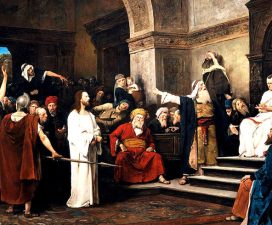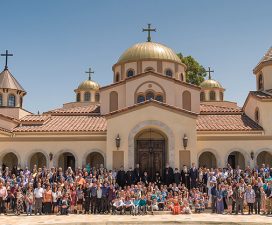Remarks of President Ronald Reagan at 1985 Conference on Religious Liberty
June 9, 2004
http://www.ird-renew.org/Home/Home.cfm?ID=906&c=28
The following speech was given by President Ronald Reagan at an April 1985 conference that was co-sponsored by the State Department and the Institute on Religion & Democracy, the National Association of Evangelicals, the American Jewish Committee, the Anti-Defamation League of B’nai B’rith, and the Jacque Maritain Center at Notre Dame. In his address, the President addressed the importance of international religious freedom. Even after the fall of communism, his remarks on religious liberty continue to be relevant.
I’m deeply honored to address this conference. I know that a good many of you have come a long way to be here today. And I know you’ve given greatly of your time and energy and concern. And I could only hope, as you do, that those now suffering around the world for their beliefs will draw renewed courage from your work.
This history of religion and its impact on civilization cannot be summarized in a few days or–never mind minutes. But one of the great shared characteristics of all religions is the distinction they draw between the temporal world and the spiritual world. All religions, in effect, echo the words of the Gospel of St. Matthew: “Render, therefore, unto Caesar the things which are Caesar’s; and unto God the things that are God’s.”
President Reagan speaks at a 1985 conference on religious liberty. Representatives of co-sponsoring organizations are on the platform (left to right): Dr. Martin Cohen, the Rev. Billy Melvin, Elliott Abrams, Rabbi Marc Tanenbaum, Dr. Ralph McInerny, and IRD Chairman, Edmund W. Robb, Jr..
What this injunction teaches us is that the individual cannot be entirely subordinate to the state, that there exists a whole other realm, an almost mysterious realm of individual thought and action which is sacred and which is totally beyond and outside of state control. This idea has been central to the development of human rights.
Only in an intellectual climate which distinguishes between the City of God and the City of Man and which explicitly affirms the independence of God’s realm and forbids any infringement by the state on its prerogatives, only in such a climate could the idea of individual human rights take root, grow and eventually flourish.
We see this climate in all democracies and in our own political tradition. The founders of our republic rooted their democratic commitment in the belief that all men are endowed by their Creator with certain inalienable rights. And, so, they created a system of government whose avowed purpose was and is the protection of those God-given rights.
But as all of you know only too well, there are many political regimes today that completely reject the notion that a man or a woman can have a greater loyalty to God than to the state. Marx’s central insight when he was creating his political system was that his–that religious belief would subvert his intentions. Under the communist system, the ruling party would claim for itself the attributes which religious faith ascribes to God alone and the state would be final arbiter of youth–or truth, I should say, justice and morality. I guess saying youth there instead of truth was just a sort of a Freudian slip on my part. (Laughter)
Marx declared religion an enemy of the people–a drug, an opiate of the masses. And Lenin said, “Religion and communism are incompatible in theory as well as in practice…we must fight religion.”
All of this illustrates a truth that, I believe, must be understood. Atheism is not an incidental element of communism, not just part of the package. It is the package. In countries which have fallen under communist rule, it is often the Church which forms the most powerful barrier against a completely totalitarian system. And, so, totalitarian regimes always seek either to destroy the Church, or, when that is impossible, to subvert it.
In the Soviet Union, the Church was immediately attacked by the communist revolution. But the Soviets, bowing to Western squeamishness about the denial of liberties, often characterize their actions as merely defensive.
In 1945, Josef Stalin met with Harry Hopkins who had been sent by Harry Truman to discuss various East-West problems. In the middle of a talk about politics, Stalin interjected the following: In 1917, he said, the Russian Communist Party had proclaimed the right of religious freedom as part of their political program. But, he said, the churches of Russia had declared the Soviet government anathema and had called on church members to resist the call of the Red Army. Now, what could we do, said Stalin, but declare war on the Church! He assured Hopkins, however, that World War II had ended the Church-state antagonism and now freedom of religion could be granted to the Church. But that, as you know, never happened.
History has taught us that you can bulldoze a church, but you can’t extinguish all that is good in every human heart. And, so, in spite of the dangers involved, there are Christians and Jews and Muslims and others throughout the communist world who continue to practice their faith. Some of them have been imprisoned for their courage. There’s the late Valerie Marchenko who died in a Soviet prison hospital a few short months ago. He was 37 years old, a scholar, and a Christian, who, at his most recent trial, spoke of his belief in God and his faith in human goodness. There’s Father Gleb Yakunin who was recently sent to Siberia for five years of internal exile. He’s another “prisoner of faith.” And Bronislav Borovsky, recently sentenced for smuggling Bibles into Czechoslovakia. These are only a few of many.
Dr. Ernest Gordon, the President of an organization named CREED, Christian Rescue Effort for the Emancipation of Dissidents, noted that on a recent trip to Eastern Europe he spoke with a priest who had spent 10 years in prison. The priest asked him to deliver a message to the West: There is a war going on. It is not nuclear, but spiritual. The fallout of the atheistic explosion is everywhere. But Dr. Gordon added, “Although the fallout may be everywhere, we are reminded that God too is everywhere and not even tyrannies can keep Him out.”
We in the United States have protested this terrible abuse of people who are nothing less than heroes of this century. Most recently when Congressional leaders met in Moscow with General Secretary Gorbachev, they gave the Soviet leadership a list of Baltic and Ukrainian prisoners of conscience, and the Council on Soviet Jewry and other groups were magnificent in making sure that the Congressional delegation did not leave without extensive data on repression against Jews in the Soviet Union.
Religious persecution, of course, is not confined to Europe. We see it in Iran, whose leaders have virtually declared war on the Bahais; we see it in Afghanistan where the Soviet military has resorted to increasingly cruel measures against the Moslem people; and we see a variation on how to abuse religious freedom in the Sandinista regime of Nicaragua.
In Nicaragua, the Sandinista regime is faced with a politically active Church that, although it supported the revolution, is now considered a major obstacle to complete totalitarian control. Sometime back, Nicaraguan Bishop Pablo Antonio Vega said that, “We are living with a totalitarian ideology that no one wants in this country.”
The Sandinistas are actively attempting to discredit and split the Church hierarchy. And there’s one new area to be watched. The Sandinistas, like all communist regimes, are injecting their ideology into the educational system and have begun widespread campaigns to indoctrinate children and adults.
But the Catholic Church is fighting to maintain autonomy and keep this indoctrination out of their churches and schools. I just had a verbal message delivered to me from the Pope urging us to continue our efforts in Central America.
Well, this thing that I was mentioning has not been resolved. Cuba solved the problem by closing all private schools including religious schools. The general state of religious liberty in Nicaragua is suggested by testimony from various sources but most vividly by those who have fled this brutal regime. . . .
When I think of Nicaragua these days, it occurs to me anew that you can judge any new government, any new regime by whether or not it allows religion to flourish. If it doesn’t, you can be sure it’s an enemy of mankind, for it’s attempting to ban what is most beautiful in the human heart.
But we mustn’t feel despair because it’s not appropriate to the times. We’re living in a dramatic age. Throughout the world, the machinery of the state is being used as never before against religious freedom. But at the same time, throughout the world, new groups of believers keep springing up. Points of light flash out in the darkness and God is honored once again.
Perhaps this is the greatest irony of the communist experiment. The very pressure they apply seems to create the force, friction and heat that allow deep belief to once again burst into flame.
I believe that the most essential element of our defense of freedom is our insistence on speaking out [or the cause of religious liberty. I would like to see this country rededicate itself whole-heartedly to this cause. I join you in your desire that the Protestant Churches of America, the Catholic Church and the Jewish organizations remember the members of their flock who are in prison or in jeopardy in other countries. We are our brothers keepers, all of us. And I hope the message will go forth from this conference: To prisoners of conscience throughout the world, take heart, you have not been forgotten. We, your brothers and sisters in God, have made your cause our cause. And we vow never to relent until you have regained the freedom that is your birthright as a child of God. . . .
Thank you. God bless all of you.



